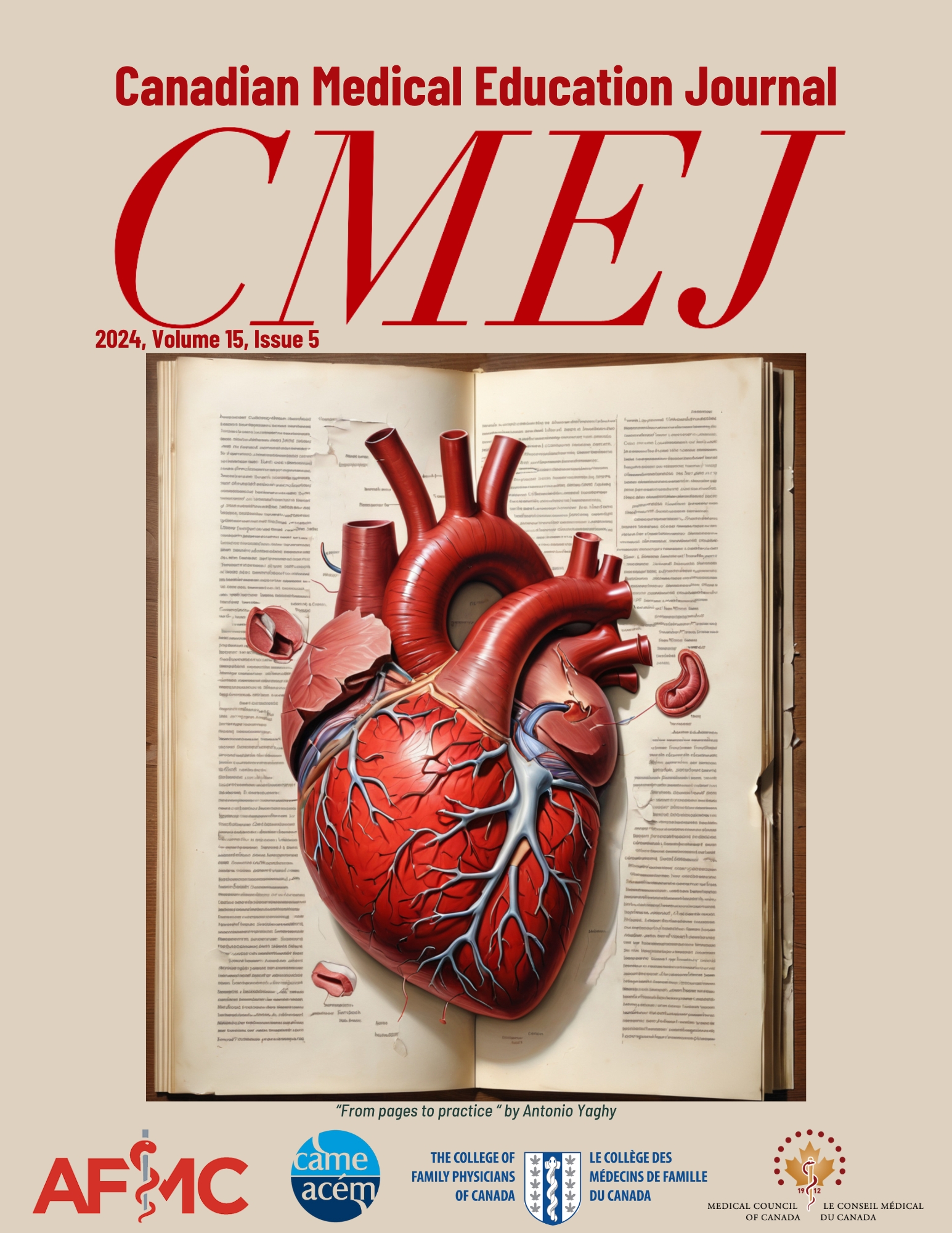Eight ways to support faculty with Entrustable Professional Activities
DOI:
https://doi.org/10.36834/cmej.78320Abstract
Competency Based Medical Education (CBME) is pushing the medical profession to be more accountable in our standards of assessment. This has led us to focus our efforts at the top of Miller’s pyramid, where we aim to see what the trainee ‘does’ in the clinical environment. In Canadian Royal College specialty training, this has come in the form of workplace-based supervision of trainees performing Entrustable Professional Activities (EPAs). This is unfamiliar territory for many residents and faculty, and implementation of an additional assessment process into already busy clinical practice has been particularly challenging. Because EPA assessments serve as significant contributors in new programs of assessment, failure to collect high quality EPA assessments threaten the validity of this new system. Understanding the barriers to and enablers of EPA acquisition can inform faculty development initiatives to ensure success.
Based on our previous work studying early experiences of EPA assessment acquisition in Emergency Medicine, we have identified eight key concepts to guide faculty development initiatives, namely: the rationale for CBME, the ‘behind the scenes’ of CBME, how to construct rich narrative comments, effective use of supervision scales, the tension of EPA assessments being both formative and summative, the importance of a shared responsibility between residents and faculty for EPA assessment completion, familiarity with the suite of EPAs, and tips and tricks for incorporating EPA assessment completion into busy clinical practice. These key concepts can be integrated into an overall faculty development strategy for building this now essential skill set.
Downloads
References
Frank JR, Karpinski J, Sherbino J, et al. Competence By Design: a transformational national model of time-variable competency-based postgraduate medical education. Perspect Med Educ. 2024;13(1). https://doi.org/10.5334/pme.1096 DOI: https://doi.org/10.5334/pme.957
Paterson QS, Alrimawi H, Sample S, et al. Examining enablers and barriers to entrustable professional activity acquisition using the theoretical domains framework: w qualitative framework analysis study. AEM Educ Train. 2023;7(2):e10849. https://doi.org/10.1002/aet2.10849 DOI: https://doi.org/10.1002/aet2.10849
Cruess SR. Professionalism and medicine’s social contract with society. Clin Orthop. 2006;449:170-176. https://doi.org/10.1097/01.blo.0000229275.66570.97 DOI: https://doi.org/10.1097/01.blo.0000229275.66570.97
Oswald A, Dubois D, Snell L, et al. Implementing Competence Committees on a National Scale: Design and Lessons Learned. Perspect Med Educ. 2024;13(1):56-67. https://doi.org/10.5334/pme.961 DOI: https://doi.org/10.5334/pme.961
Richardson D, Landreville JM, Trier J, et al. Coaching in Competence by Design: a new model of coaching in the moment and coaching over time to support large scale implementation. Perspect Med Educ. 2024;13(1):33-43. https://doi.org/10.5334/pme.959 DOI: https://doi.org/10.5334/pme.959
Woods R, Elder J. Context...Performance...Recommendation and Reinforcement (CPR2): bringing narrative comments to life in competency based medical education. Available at https://icenet.blog/2024/02/06/contextperformancerecommendation-and-reinforcement-cpr2-bringing-supervisor-narrative-comments-to-life-in-competency-based-medical-education/ [Accessed Mar 6, 2024].
Richardson D, Kinnear B, Hauer KE, et al. Growth mindset in competency-based medical education. Med Teach. 2021;43(7):751-757. https://doi.org/10.1080/0142159X.2021.1928036 DOI: https://doi.org/10.1080/0142159X.2021.1928036
Watling CJ, Ginsburg S. Assessment, feedback and the alchemy of learning. Med Educ. 2019;53(1):76-85. https://doi.org/10.1111/medu.13645 DOI: https://doi.org/10.1111/medu.13645
Cheung WJ, Bhanji F, Gofton W, et al. Design and Implementation of a national program of assessment model – integrating Entrustable Professional Activity assessments in Canadian specialist postgraduate medical education. Perspect Med Educ. 2024;13(1):44-55. https://doi.org/10.5334/pme.956 DOI: https://doi.org/10.5334/pme.956
Mador B, Daniels VJ, Oswald A, Turner SR. Learner phenotypes in Competency-Based Medical Education. Med Sci Educ. 2021;31(6):2061-2064. https://doi.org/10.1007/s40670-021-01380-1 DOI: https://doi.org/10.1007/s40670-021-01380-1
Downloads
Published
How to Cite
Issue
Section
License
Copyright (c) 2024 Rob Woods, Melissa Bouwsema, Warren Cheung, Andrew Hall, Teresa Chan, Quinten Paterson

This work is licensed under a Creative Commons Attribution-NonCommercial-NoDerivatives 4.0 International License.
Submission of an original manuscript to the Canadian Medical Education Journal will be taken to mean that it represents original work not previously published, that it is not being considered elsewhere for publication. If accepted for publication, it will be published online and it will not be published elsewhere in the same form, for commercial purposes, in any language, without the consent of the publisher.
Authors who publish in the Canadian Medical Education Journal agree to release their articles under the Creative Commons Attribution-Noncommercial-No Derivative Works 4.0 Canada Licence. This licence allows anyone to copy and distribute the article for non-commercial purposes provided that appropriate attribution is given. For details of the rights an author grants users of their work, please see the licence summary and the full licence.











